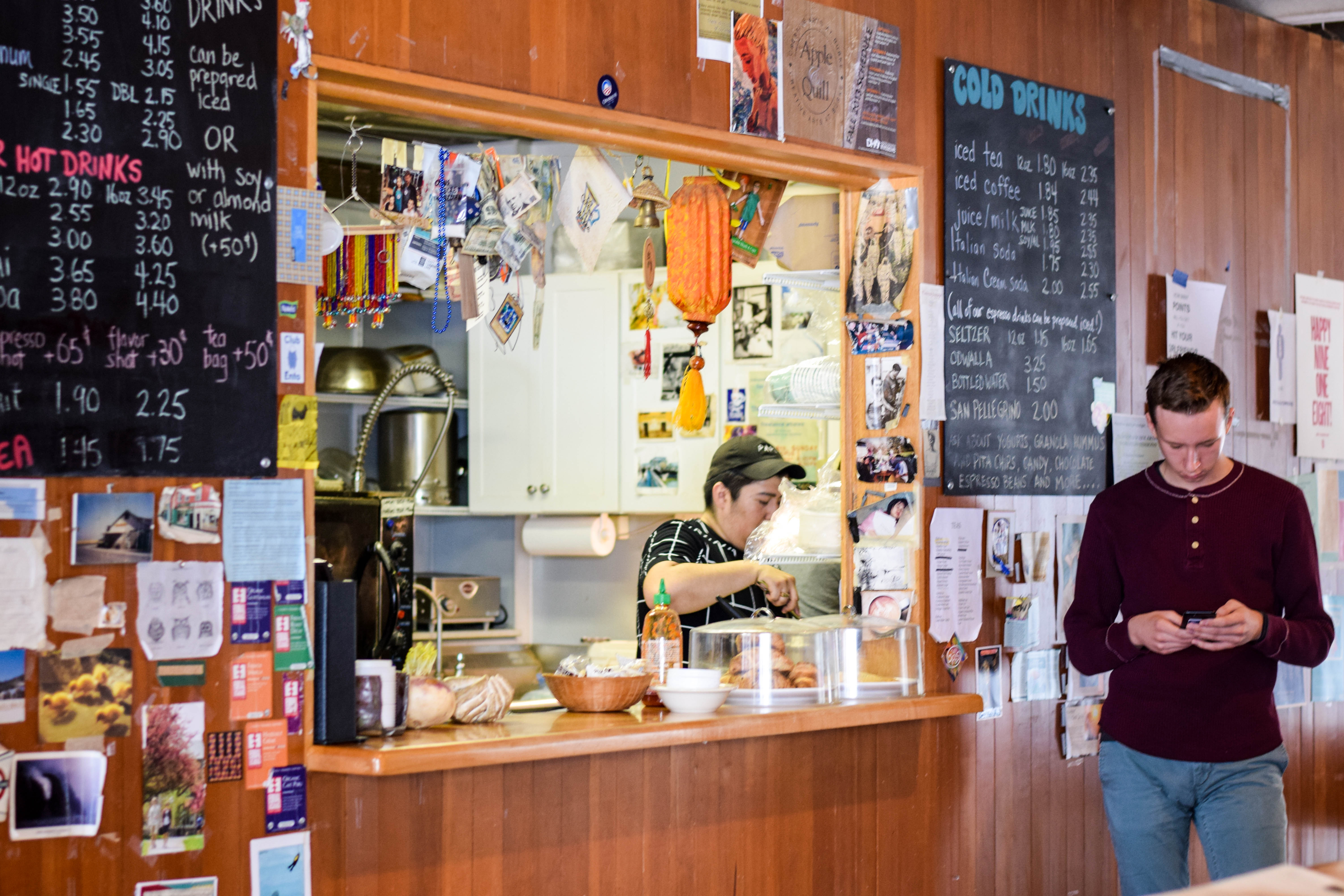News
Cafe Opus makes eco-friendly strides with new sustainability initiatives
By Margaret Riordan ’19
March 30, 2017
Tags news
Morning, noon and night Hamilton students flood Opus 1 and 2 seeking caffeine, lunch or something sweet. Many students visit daily, and some even twice daily. Unfortunately, the downside of Hamilton’s Opus fix is not just a coffee addiction; it is an overwhelming amount of waste. Americans consume 146 billion cups of coffee a year, many of which can be attributed to all-nighters, early mornings and finals week. With all that energy comes 146 billion cups and tops, the majority of which end up in the trash, due to either a lack of attention to or understanding of recycling practices. Those cups last much longer than the caffeine they provide and will sit in a landfill along with the plethora of other materials all to-go eateries use. This year, Larry Bender, Sarah Georges and Nancy Soule, managers of Opus and strong members of the Hamilton community, embarked on a mission to reduce Opus’ waste. Cafe Opus hopes to implement social consciousness into their daily duties by using sustainable products with the hopes that these changes will inspire students to make changes in their own habits.
Opus’ sustainability initiatives not only reduce waste within the cafe through integrating biodegradable and recyclable products, but also teach employees and customers the importance and positive impacts of these practices. In order to understand Opus’ initiatives, it is first important to explain the breakdown of disposable materials: biodegradable, recyclable, and trash. For a product to be biodegradable it must completely break down and decompose into elements found in nature within a reasonably short period of time after disposal. Recyclable products must be able to be collected, separated for reuse or use in manufacturing or assembling another item. Essentially, recycling a product turns it into something new and is commonly found with many plastics, glass, aluminum and cardboard. Finally, trash refers to any product that will not break down in nature and cannot be recycled. Yes, unfortunately, that includes straws.
So how does Opus break down? The cafe is subject to the usual bulk of disposable materials and the problems embedded into these products. Most to-go hot cups are made from the same industry standard polyethylene lining, which takes over a year, at least, to break down. Problems expand beyond the products themselves as students have struggled to understand how to properly dispose their Opus trash. Some cups need to be separated, as tops and sleeves may be recyclable while cups are not. Additionally, Opus carries many products in plastic bottles, which are difficult to recycle compared to glass or aluminum. These primary issues of consumption and disposal all relate to a fundamental misunderstanding of the true cost of the final products handed across the window. The price of a cup of coffee or a bowl of soup does not cover only the ingredients, but also the costs for production, shipping and disposal of all the materials used. While most customers simply see a free disposable cup, these social costs are embedded into the prices cafes use, and therefore, making Opus more sustainable comes at a price. Luckily, it is a price Opus is more than willing to pay.
The sustainability overhaul at Opus is marked by restocking disposable materials, eliminating bottled products and ultimately, introducing composting. Opus has begun using bowls, cups and utensils made of corn, including hot coffee cups that use a biodegradable vegetable poly lining. Following HEAG’s recent “Take Back the Tap” campaign to remove unnecessary bottled water from campus, Opus will no longer stock bottled water. The team is also making a transition to aluminum cans and glass bottles such as the new Kombucha or the classic San Pellegrino. Additionally, Physical Plant installed a brand new filtered water fountain behind Opus 1 to accompany the fountain next to Opus 2. Finally, Opus now composts all scraps and materials from throughout the day including lunch leftovers, coffee grinds and other products that previously piled up in the trash. Opus will join with McEwen and Commons to compost at the local Crane Farm on College Hill Road.
All these changes will only be as effective as the engagement from the Hamilton community allows them to be. Hamilton’s Director of Sustainability Brian Hansen noted, “People think that sustainability is something that ‘they’ do, but there is no ‘they’ there is only ‘we.’” Opus took Hansen’s advice to heart and is taking the necessary steps to encourage students to lean into sustainability on campus. Working with the Sustainability Coordinators, Opus put together poster guides for recycling and composting at the cafes. The posters will go up at Opus 1 and 2 to break down exactly what is biodegradable, recyclable and trash. Even better, McEwen and Commons use the same biodegradable cups, so the information from the boards will be applicable all around campus. The boards will also advertise Opus’ incentives to reduce, reuse, recycle, promoting the cafe’s 5 cent discount for bringing your own mug or plate.
Opus’ dedication to sustainability and student engagement is illustrated in the cafe’s decision not to raise prices to reflect the elevated cost of the new products. Keeping the prices the same encourages students that sustainability does not have to come at a higher cost for the greater consumer when companies take the initiative. Prompting students to increase their conservation habits by bringing their own mugs or separating their trash emphasizes student responsibility, analytical thinking and community engagement. Paper products are just the beginning.





